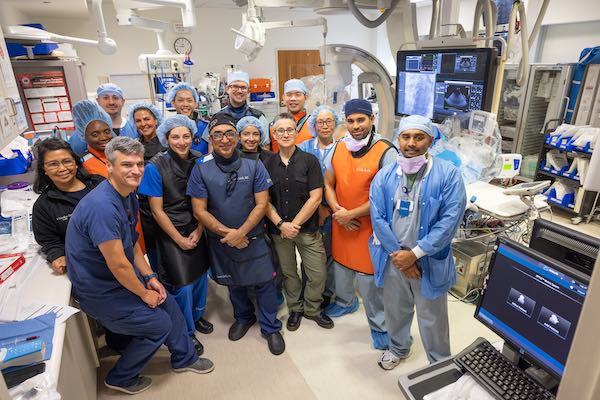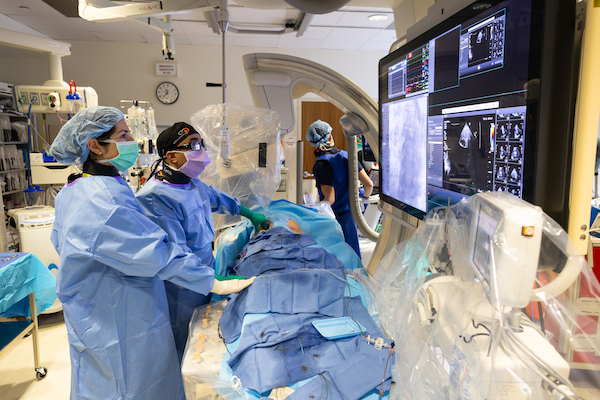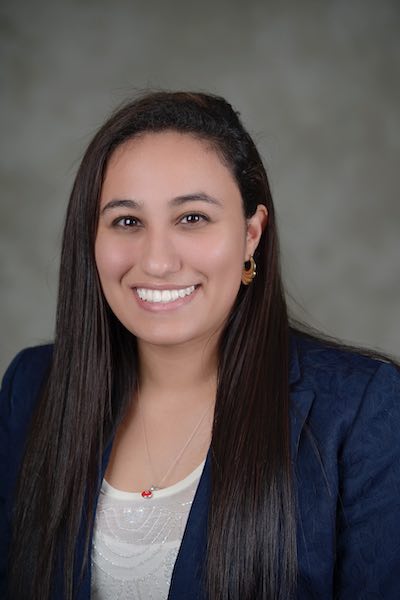WP Hospital Completes First Minimally Invasive Transcatheter Aortic Valve Replacement
- Details
- Written by Joanne Wallenstein
- Category: Health
 White Plains Hospital has announced the launch of the Montefiore Structural Heart Program at White Plains Hospital with the successful completion of its first three minimally invasive heart valve replacement procedures, known as Transcatheter Aortic Valve Replacements (TAVR). The procedures, performed by Dr. Azeem Latib, a leading expert in interventional cardiology and Director of the Montefiore Structural Heart Program at White Plains Hospital, was performed in one of the Hospital’s state-of-the-art cardiac catheterization laboratories and marks a key milestone in the growth of the Hospital’s advanced cardiac services.
White Plains Hospital has announced the launch of the Montefiore Structural Heart Program at White Plains Hospital with the successful completion of its first three minimally invasive heart valve replacement procedures, known as Transcatheter Aortic Valve Replacements (TAVR). The procedures, performed by Dr. Azeem Latib, a leading expert in interventional cardiology and Director of the Montefiore Structural Heart Program at White Plains Hospital, was performed in one of the Hospital’s state-of-the-art cardiac catheterization laboratories and marks a key milestone in the growth of the Hospital’s advanced cardiac services.
More than five million Americans are diagnosed with heart valve disease each year, including 1.5 million with aortic stenosis – or the narrowing of the aortic valve. This condition often appears in those 65 and older and deteriorates with age. Older patients with aortic stenosis and other congenital heart diseases can often benefit from a TAVR.
The procedure, which typically takes less than an hour, involves specially trained cardiac interventionalists, in collaboration with world-class cardiac surgeons, using advanced imaging techniques to guide a flexible tube called a catheter through a small needle hole in the groin, up through the blood vessels, to the diseased aortic valve. The team then uses the catheter to deploy a new valve, immediately restoring function and blood flow. Patients are cared for by highly trained cardiac intensivists in the Hospital’s Cardiac ICU, and many of our patients go home the next day.

White Plains Hospital is one of just two healthcare facilities in Westchester offering this life-saving procedure to patients in Westchester County. Every patient is fully evaluated by a cardiac surgeon, interventional cardiologist, cardiologist and radiologist to determine the ideal course of treatment, whether that is a TAVR procedure or open-heart surgery. Also, with advanced imaging technology on-site, including high-resolution CT scanning, fusion imaging and cardiac MRI, patients can undergo convenient, same-day pre-operative testing at the Center for Advanced Medicine & Surgery (CAMS) in White Plains prior to the procedure.
The addition of the Montefiore Structural Heart Program at White Plains Hospital builds on the success of the Montefiore Cardiac Surgery Program at White Plains Hospital, which has exceeded national benchmarks for quality with exceptional patient outcomes in the two years since its launch. The program was recently recognized with a distinguished 3-star rating, the highest available, from The Society of Thoracic Surgeons, a designation that places it among the top 10% of programs for heart bypass surgery in the United States and Canada. White Plains Hospital’s cardiac care capabilities are further strengthened by its world-class Interventional Cardiology program and Cardiac Electrophysiology department, which is focused on the diagnosis, treatment and prevention of arrythmias and other emergent cardiac issues. White Plains Hospital’s experts work closely with a network of cardiologists and specialists throughout the Hudson Valley to ensure each patient receives the specialized care they need, close to home. 
“This program underscores White Plains Hospital’s commitment to growing its advanced cardiac services for patients across the Hudson Valley,” said Dr. Latib. “These expanded capabilities allow us to provide the most appropriate treatment based on our patients’ needs, whether they require open-heart surgery or a minimally invasive procedure like a TAVR. We are excited to begin performing these procedures and look forward to continuing to advance the Structural Heart Program at White Plains Hospital.”
To learn more about the Montefiore Structural Heart Program at White Plains Hospital, visit our website or call (914) 849-4200.
The Challenges of Rheumatoid Arthritis
- Details
- Written by Joanne Wallenstein
- Category: Health
 (This article was submitted by Dr. Leia Meir, Rheumatology from White Plains Hospital)
(This article was submitted by Dr. Leia Meir, Rheumatology from White Plains Hospital)
Many people are aware of what arthritis is, but they may not know that there are over 100 different forms of the disease and related conditions. Rheumatoid arthritis is the most common type of autoimmune arthritis, affecting an estimated 1.3 million Americans. While there is no cure for RA (or other arthritic conditions), there are effective ways of treating and managing the disease.
The need for doing so is plain. RA affects joint linings, causing painful swelling in such locations as the joints, back and muscles. If not treated effectively, the inflammation associated with RA can lead to bone erosion and result in joint deformity. There is also quality of life to consider for all arthritic patients: The Centers for Disease Control and Prevention estimates that more than one-third of adults who have arthritis report that it limits their leisure activities and work, while 25% of them say it causes severe pain. Fatigue, an inability to focus on tasks, depression, and other mental difficulties have all been associated with the disease.
Risk factors include whether you have a first-degree (parent, sibling) or second-degree (grandparent) relative who suffers from RA. If so, keep in mind that just because such a relative has it does not automatically mean you will develop it. Other risk factors include exposure to cigarette smoke, bacteria, viruses, gum disease, and lung disease.|
Determining whether you have RA can be tricky. Especially as we age, many of us experience stiffness when we first get out of bed. But if that stiffness lasts for 30 minutes or more, over six weeks or more, then you may have a chronic case of RA. There are also other physical manifestations to watch for, including rheumatoid nodules, firm, usually non-painful, subcutaneous (under the skin) bumps that tend to appear on fingers and knuckles, elbows, knees, and forearms. In fact, up to 40% of people with RA will eventually develop these nodules.
Ideally, diagnosing RA will be completed early before the more severe symptoms appear. There is no one test to provide a definitive answer, however, as RA presents in a similar fashion to osteoarthritis (the most common type of arthritis, affecting over 32 million Americans), Lupus, Sjogren’s Syndrome, and others. Nevertheless, an Anti-CCP antibody test (ACCP or CCP) looks for cyclic citrullinated peptide (CCP) antibodies, which can be found in the blood of 60% to 80% of people with rheumatoid arthritis. This test is usually conducted along with rheumatoid factor (RF) blood test. Depending on those results, a doctor may recommend X-rays, MRIs and ultrasounds to determine the severity of the disease and track the rate of its progression.
As is often the case, early detection is key when discussing treatments. Over the last couple of decades, biologics – also known as DMARDS, or disease-modifying antirheumatic drugs – have come to the forefront in treating RA, given they can quickly and effectively alleviate pain and essentially put the disease into remission. These medications can be taken in pill form, or via infusion or injection. While not everyone is excited about receiving a shot, an injection may be the preferable way to go for certain individuals. The big takeaway here is that if something is hurting, you need to discuss it with a healthcare professional, starting with your primary care provider. They can run some of the aforementioned tests and, if necessary, refer you to a rheumatologist. Living with RA in a comfortable manner is certainly achievable – but only with professional help.
The big takeaway here is that if something is hurting, you need to discuss it with a healthcare professional, starting with your primary care provider. They can run some of the aforementioned tests and, if necessary, refer you to a rheumatologist. Living with RA in a comfortable manner is certainly achievable – but only with professional help.
Dr. Lea Meir is a rheumatologist at White Plains Hospital Physician Associates, with offices in Larchmont and New Rochelle. To make appointment, call 914-849-7400 (Larchmont) or 914-235-8224 (New Rochelle).
Health Matters
The original version of this article was published in Health Matters, a White Plains Hospital publication.
SVAC to Offer Vaccines on 11-24 ... Sign Up Today
- Details
- Written by Joanne Wallenstein
- Category: Health
 Based on requests received during the last two Covid clinics, Scarsdale Volunteer Ambulance Corps will hold one last Flu and Covid Vaccine Clinic for ages 5 and above on Friday, November 24th from 10:00am to 2:00pm. Parents requested another clinic for their college students home for Thanksgiving. Interested parties MUST sign up in advance at svacvaccines.timetap.com. No walk-ins will be permitted.
Based on requests received during the last two Covid clinics, Scarsdale Volunteer Ambulance Corps will hold one last Flu and Covid Vaccine Clinic for ages 5 and above on Friday, November 24th from 10:00am to 2:00pm. Parents requested another clinic for their college students home for Thanksgiving. Interested parties MUST sign up in advance at svacvaccines.timetap.com. No walk-ins will be permitted.
SVAC will be accepting insurance payments for the vaccine for Scarsdale residents. This will be the last vaccine clinic. Since we have to order the vaccines, the cut-off for signing up for the clinic is Monday, November 20th at 9:00am.
At the Board of Trustees meeting on Tuesday November 14, David Raizen, President of SVAC reported that SVAC has vaccinated 500 people in the last two weeks. They are billing the insurance companies for the vaccines. Unfortunately 43 people who had appointments did not show up. Another 200 people were vaccinated at home.
SVAC needs to raise $200,000 to stay afloat in the coming year. They recently mailed out 6,700 appeals for funds and to date have received 370 donations totaling $100,000. Two of these were for more than $10,000. However, they need to raise another $100,000 and ask you to give generously for this essential community service.
Don’t Let a Diagnosis of Type 1 Diabetes Catch You Off Guard
- Details
- Written by Joanne Wallenstein
- Category: Health
 The following was submitted by Dr. Debra Etelson, Pediatrics at White Plains Hospital
The following was submitted by Dr. Debra Etelson, Pediatrics at White Plains Hospital
When my then-nine-year-old son suddenly discovered that he was diabetic, he certainly surprised himself – and his pediatrician mother as well!
We were in the car with one of my older son’s friends, along with my then-3-year-old, who had been diagnosed at 13 months with Type 1 (formerly known as juvenile diabetes) about four months earlier. My older son dutifully demonstrated to his friend how easy it was to check the baby’s blood sugar level, then did the same to himself. The American Diabetes Association (ADA) recommends anyone with a level of 240 or above seek medical attention; his was several hundred above that, so our outing became very serious very quickly.
I’m happy to report that both of my sons – now 17 and 22 – are doing fine. But being aware of how diabetes works, and of what to watch out for, is something every parent should know.
According to the ADA’s latest estimates, about 283,000 Americans under age 20 have been diagnosed with diabetes. That’s roughly 0.35% of that population. Type 1 diabetes occurs when a person’s pancreas produces little or no insulin, which the body uses to convert sugar into energy. Treatment involves using insulin and refining one’s diet and lifestyle to prevent complications; the disease requires continuous insulin, blood sugar monitoring, and carbohydrate counting throughout one’s lifetime.
(For the record, Type 2 diabetes occurs when the body produces insulin, but the cells don’t respond appropriately due to what is called insulin resistance. While there is no cure for either type, diet and other lifestyle changes can help a person reverse – but not eliminate – the disease.)
Type 1 is an autoimmune condition whose exact cause is still unknown, but leading theories attribute it to genetics, environmental factors, and viruses; the latter would certainly seem to be true given what we saw during the height of COVID-19. The incidence rate, or number of new cases, of Type 1 diabetes was rising by 3-4% per year before COVID, increased by 14% during the first year of the pandemic and was 27% higher than the pre-pandemic period in the second year.
Type 1 diabetes can be diagnosed in a child as an infant, roughly 6 months after birth; it usually appears after age 5, though some people don’t get it until they are in their late 30s. Note that, despite the potential genetic component, a mother who is diabetic does not necessarily give birth to a child with diabetes.
What to Watch For
Babies obviously cannot verbalize how they’re feeling, but parents can tell if there’s a chance of diabetes (or other possible healthcare concerns) by observing the following:
• Increased urination (resulting in unusually frequent diaper changes for babies)
• A seemingly insatiable thirst/hunger
• Reports of blurred vision
• Unexplained weight loss
• Lethargy in a previously active child
Lethargy was what brought us in with our youngest child – whose level was at a frightening 900 – and, along with mood swings, had led us to suspect our older child might have developed it as well. Keep in mind that it may take months, if not years, for the above symptoms to manifest themselves, but a blood test during a child’s routine physical can indicate elevated blood sugar levels, both for Type 1 and Type 2.
If a child is diagnosed with diabetes, the rest of the immediate family is typically tested as well. While genetics are believed to play a part in contracting the disease, one family member having it does not mean they all (or any of them) will as well.
When at school or otherwise outside of the house, kids five and up with diabetes can usually self-administer insulin with an insulin pump, which involves installing a soft catheter in the upper arm, belly, hip, buttock, or thigh. Thin tubing connects the catheter to the pump, which can be worn in a pocket, on a belt, or in a pouch. School nurses are an amazing resource, and they can administer insulin to a child if necessary or preferred.
School nurses are an amazing resource, and they can administer insulin to a child if necessary or preferred.
A diabetes diagnosis can be scary for child and parent alike. But by being aware of warning signs, and of the treatments and support that are available, a happy and healthy life can be possible.
Dr. Debra Etelson is a board-certified pediatrician at White Plains Hospital Physician Associates in Somers. To make an appointment, call 914-849-7075.
Health Matters
The original version of this article was published in Health Matters, a White Plains Hospital publication.
Sign Up Today for the SVAC Vaccine Clinic on 11-11
- Details
- Written by Joanne Wallenstein
- Category: Health
 After a great turn out on Saturday November 4, the Scarsdale Volunteer Ambulance Corps will have another Flu and Covid Vaccine Clinic for ages 5 and above on Saturday, November 11th from 10:00am to 2:00pm. Interested parties MUST sign up in advance at svacvaccines.timetap.com. No walk-ins will be permitted.
After a great turn out on Saturday November 4, the Scarsdale Volunteer Ambulance Corps will have another Flu and Covid Vaccine Clinic for ages 5 and above on Saturday, November 11th from 10:00am to 2:00pm. Interested parties MUST sign up in advance at svacvaccines.timetap.com. No walk-ins will be permitted.
SVAC will be accepting insurance payments for the vaccines. The cut-off for signing up for the clinic is Wednesday November 8th at 8am since they need to order the vaccines Wednesday morning.
Since SVAC has to pay for the vaccine in advance, please only sign up if you are sure you can come for your vaccination.














